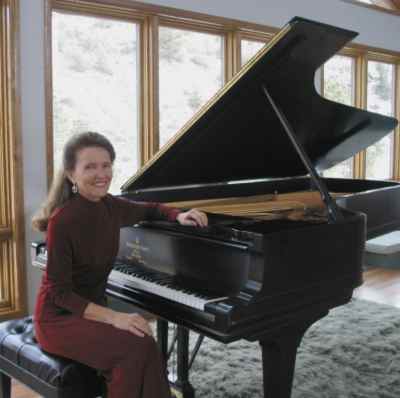Article by Sue Snively
Local Arts – May 2004 – Colorado Central Magazine
THOSE WHO TRAVEL north from Buena Vista toward the Colorado Midland tunnels and Elephant Rock may experience an unexpected treat. There could be some musical accompaniment to the scenery.
Just before crossing the Arkansas River, as you go past a driveway with a BoatArk painted on a large rock, roll down your windows and go slowly. If you’re fortunate, you might hear the sound of a Steinway grand, coming out of a house of wood, glass and stone.
Be prepared to adjust your mood. The music might be traditional, such as Beethoven or Mozart or Schubert, or an accessible modern composer such as Tan Dun, who wrote the score for the movie Crouching Tiger, Hidden Dragon, or an adventurous piece by the Japanese composer Toru Takemitsu, with exotic instrumentation and 12 tone music.

No matter what the style, you can be sure the piano music is emanating from the mind and hands of professional pianist Jo Boatright, who recently moved here from Dallas with her husband Harvey.
Jo grew up in Greeley and Sterling, Colorado, and first became acquainted with the Arkansas valley as a child. Her father, a school teacher, would take summer jobs in the area. After living on the east coast and in Texas for many years, Jo and Harvey decided to come back to Colorado.
At first, she and her sister’s family shared a vacation cabin near Marshall Pass, but Jo and Harvey wanted their own place, where she could play Schubert while watching and listening to the Arkansas River. BoatArk is that place.
Jo Boatright’s professional musical training started as a small child. Her mother (who at age 91 is still giving piano lessons) began teaching her the art of playing the piano. When Jo was 12, Dr. Max Lanner from Colorado College in Colorado Springs, became her piano teacher. For four years her mother would drive her twice a month from Sterling to Denver for the lessons.
She continued her education in Colorado Springs, and received her degree from Colorado College. While she was studying there, she met and married Harvey Boatright. They both went to Boston for graduate work and both earned Masters of Music degrees from The New England Conservatory of Music. Harvey, who plays the flute, obtained a position with the Dallas Symphony Orchestra.
THE BOATRIGHTS spent the next 43 years teaching and playing music in the Dallas area. Even though Jo and Harvey have retired from some of their professional duties and moved back to Colorado, strong ties to the Dallas area remain. Cellist Camilla Boatright, their daughter, and her friend, double bassist Joel Bonzo still live there. They both joined Harvey and Jo for a benefit concert for Habitat for Humanity at BoatArk last August.
Strictly within the family, Jo, Harvey and Camilla perform as the Boatright Trio.
During her professional career, Jo has traveled extensively. She has performed in Europe, Mexico, Venezuela, the former Soviet Union and all over the United States, including the Kennedy Center in Washington D.C. Her repertoire has included composers from all eras, but the greatest emphasis has been on contemporary composers.
Jo is the co-founder of Voices of Change, Modern Music Ensemble, which she started in Dallas in 1975. She was Artistic Director for 28 years and now holds the title Artistic Director Emerita. This group’s principal emphasis is premiering, through arrangement of concerts, living and modern composers. Besides Tan Dun and Toru Takemitsu, mentioned above, the group has commissioned over fifty works from such varied composers as Ellen Zwillich, who was the Composer in Residence for the New York Philharmonic; and George Crumb, this year’s Musician of the Year for Musical America.
SEVERAL OF THE MODERN COMPOSERS, most notably George Crumb and John Cage, have been particularly challenging. Their works have emphasized not only the notes one would expect to be played, but also experimental sounds that you wouldn’t expect from a conventional piano. The score may call for various parts of the piano besides the keys to be struck with hands, knuckles or an auxiliary stick. Or the score may be fairly conventional, until a notation directs the performer to reach inside the strings and pluck a particular note; that’s impossible with an upright piano, and difficult enough with a larger, horizontal concert grand piano!
While not all such music has been widely accepted, the works have become a vibrant part of the mission of Voices of Change. With Voices of change, Boatright has won four ASCAP (American Society of Composers, Authors and Publishers) Awards for Adventuresome Programming and received a Grammy nomination for the Voces Americanos CD on the CRI label, which featured the music of living Latino composers. She has recorded for the Crystal, Redwood, Music & Arts, and Odyssey labels.
Jo Boatright has had several academic titles. She is a former Associate Professor of Music at Texas Christian University, and at the University of Texas at Arlington and Dallas, and was an Adjunct Professor at Southern Methodist University. She was the Music Director at the First Unitarian Church of Dallas for forty-three years.
While teaching at Texas Christian University in Fort Worth, she served for eight years as the teaching assistant to the famous Hungarian Pianist, Lili Krause. Concerning the students they taught, Jo says, “We complemented each other with our different teaching styles; Lili would rip them apart and I would put them back together.”
In 1981, Jo and others in Dallas organized a group called The Walden Chamber Music Society. That group is now a nationally renowned quartet featuring principal players of the Dallas Symphony including Violinist Maria Schleuning, Violist Barbara Hutis, Cellist Christopher Adkin and herself as Pianist. Their concert performances have gradually begun to move to the Arkansas Valley. In October of 2003, members of the group performed selections from Mozart, Brahms, Bozza and Bridge at the Steam Plant in Salida for a very enthusiastic audience, and a second concert took place in March.
MUSIC IS NOT Jo Boatright’s only passion. She also loves climbing. Proof, if any were needed, that she has not forsaken her Colorado heritage is the fact that she climbs under her own power, rather than with a stereotypical Texan 4-wheel-drive or ATV. With her nephew, horticulturist Keith Williamson, Boatright has climbed 35 of Colorado’s fourteeners, and hopes to climb all 54.
Jo says she has met many wonderful people in this area who share her love for climbing. But climbing is not her only avocation. She’s also a gourmet cook. When Jo entertains, she goes all out.
Jo is also interested in promoting music and other performing arts in the Arkansas Valley, and she would like to work with the local educational system to help make music education a bigger part of the students’ lives. Sometime in the not too distant future, Jo hopes there can be a chamber music venue in Buena Vista. She was invited to be on the board for the new Central Colorado Performing Arts Center and is willing to work with other interested people in the area to make her hopes become a reality.
That reality now seems like a real possibility.
As I walked away from BoatArk, piano music followed me out. I heard Franz Schubert’s Trout Quintet blend with the sound of tumbling water and I realized that Central Colorado is very lucky — because Jo Boatright is a person able to make hopes and dreams come true.
My invitation to visit BoatArk induced a degree of trepidation. To be sure, musical entertainment from a couple of world class performers is a treat, and it was delightful to nibble away at Jo’s culinary creations. But how on earth can I reciprocate?
There is no obvious answer.
Sue Snively lives in Buena Vista and enjoys writing about artists.


